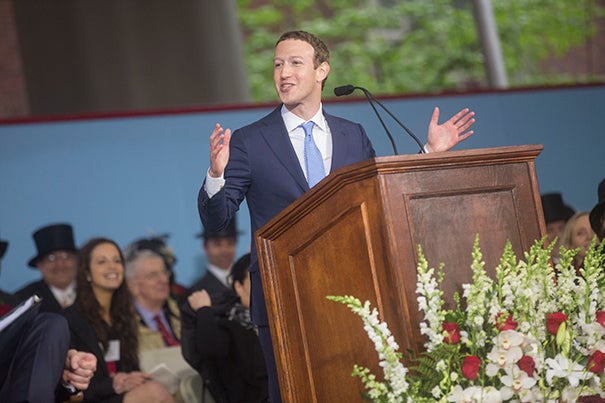3つ目:コミュニティを形成する
Purpose doesn’t only come from work. The third way we can create a sense of purpose for everyone is by building community. And when our generation says “everyone”, we mean everyone in the world.
目的は仕事からだけ得られるのではありません。3つ目の方法は、コミュニティを形成することです。私たちの世代が言う「みんな」とは、世界中のすべての人のことです。
Quick show of hands: how many of you are from another country? Now, how many of you are friends with one of these folks? Now we’re talking. We have grown up connected.
手を挙げてください:皆さんのうち何人が他の国の出身ですか?さて、この中の一人と友達になっている人は何人いるでしょうか?今、私たちは話しています。私たちは、人と人とのつながりの中で育ってきたのです。
In a survey asking millennials around the world what defines our identity, the most popular answer wasn’t nationality, religion or ethnicity, it was “citizen of the world”. That’s a big deal.
世界中のミレニアル世代に、自分たちのアイデンティティを定義するものは何かを尋ねた調査では、最も多かった答えは国籍でも宗教でも民族でもなく、「世界の市民」でした。これは大変なことです。
Every generation expands the circle of people we consider “one of us”. For us, it now encompasses the entire world.
世代が変わるごとに、私たちが「仲間」と考える人の輪は広がっていきます。私たちにとって、それは今や全世界を包含するものです。
We understand the great arc of human history bends towards people coming together in ever greater numbers — from tribes to cities to nations — to achieve things we couldn’t on our own.
私たちは、人類の歴史の大きな弧が、部族から都市、国家へと、より多くの人々が集まり、自分たちだけではできなかったことを成し遂げようとする方向に曲がっていることを理解しています。
We get that our greatest opportunities are now global — we can be the generation that ends poverty, that ends disease. We get that our greatest challenges need global responses too — no country can fight climate change alone or prevent pandemics. Progress now requires coming together not just as cities or nations, but also as a global community.
私たちは、貧困や病気をなくす世代になることができるのです。私たちの最大の課題もまた、グローバルな対応を必要としている。どの国も単独で気候変動と戦うことはできないし、パンデミックを防ぐこともできない。今、進歩のためには、都市や国家としてだけでなく、グローバル・コミュニティとして団結することが必要です。
But we live in an unstable time. There are people left behind by globalization across the world. It’s hard to care about people in other places if we don’t feel good about our lives here at home. There’s pressure to turn inwards.
しかし、私たちは不安定な時代に生きています。グローバル化から取り残された人たちが世界中にいます。自分たちの生活に満足がいかなければ、他国の人々に関心を持つことは難しいでしょう。内向き志向のプレッシャーもあります。
This is the struggle of our time. The forces of freedom, openness and global community against the forces of authoritarianism, isolationism and nationalism. Forces for the flow of knowledge, trade and immigration against those who would slow them down. This is not a battle of nations, it’s a battle of ideas. There are people in every country for global connection and good people against it.
これは、私たちの時代の闘いです。権威主義、孤立主義、ナショナリズムの力に対して、自由、開放性、国際社会の力。知識の流れ、貿易、移民を推進する勢力は、それらを遅らせようとする勢力に対抗するものである。これは国家間の戦いではなく、思想の戦いである。どの国にも、グローバルなつながりに賛成する人たちと、反対する善良な人たちがいる。
This isn’t going to be decided at the UN either. It’s going to happen at the local level, when enough of us feel a sense of purpose and stability in our own lives that we can open up and start caring about everyone. The best way to do that is to start building local communities right now.
これは国連で決定されることではありません。私たちの多くが自分の生活に目的と安定を感じ、心を開いてすべての人を思いやることができるようになったとき、それは地域レベルで起こることなのです。そのための最良の方法は、今すぐにでも地域社会の構築を始めることです。
We all get meaning from our communities. Whether our communities are houses or sports teams, churches or music groups, they give us that sense we are part of something bigger, that we are not alone; they give us the strength to expand our horizons.
私たちは皆、コミュニティから意味を得ています。家であれ、スポーツチームであれ、教会や音楽グループであれ、コミュニティは私たちに、自分が何か大きなものの一部であること、自分はひとりではないことを実感させ、視野を広げるための力を与えてくれます。
That’s why it’s so striking that for decades, membership in all kinds of groups has declined as much as one-quarter. That’s a lot of people who now need to find purpose somewhere else.
だからこそ、ここ数十年、あらゆる種類のグループの会員数が4分の1も減少しているのは、非常に驚くべきことなのです。これは、多くの人が別の場所で目的を見つける必要があることを意味します。
But I know we can rebuild our communities and start new ones because many of you already are.
しかし、私たちはコミュニティを再構築し、新しいコミュニティを立ち上げることができると思います。

